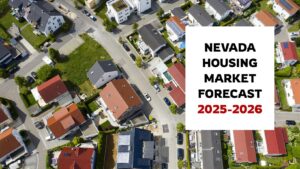Let me start by saying this: yes, the current Las Vegas tourism decline is definitely casting a shadow, and it's very likely to have a noticeable impact on the city's real estate and housing market. It's not a simple cause-and-effect, though; it's a complex web of why people are visiting less and what that means for everything from buying a house to renting an apartment.
Las Vegas Tourism Drop: Will It Impact the Real Estate or Housing Market?
It feels like just yesterday Las Vegas was the undisputed queen of entertainment, drawing millions of people year after year. I remember hearing stories from friends who worked in hospitality, always buzzing with activity, never a dull moment. But the reports coming out now in 2025 paint a different picture. Visitor numbers are down, and not just by a little bit. We're talking about a significant drop that makes you wonder what's really going on behind the glitz and glamour. And when Vegas sneezes, the rest of its economy, especially its real estate, often catches a cold.
Where Are All the Tourists Going? The 2025 Slump Explained
Looking at the numbers from the Las Vegas Convention and Visitors Authority (LVCVA), it’s clear that 2025 has been a tough year for Vegas tourism. Imagine this: in June 2025, there were about 3.094 million visitors. That might sound like a lot, but compare it to June 2024, when 3.49 million people flocked to the city, and you see an 11.3% drop. When you zoom out to the first half of 2025, the picture gets even clearer – about 1.5 million fewer visitors compared to the same period last year.
This isn't just about fewer people strolling down the Strip. It means hotel rooms are sitting empty. Occupancy rates in April 2025 dipped to around 82.9%, down from a healthier 85.3% the year before. And when hotels aren't full, they often have to lower prices to attract guests. This is reflected in the revenue per available room (RevPAR), which has reportedly fallen by as much as 28.7% on busy holiday weekends.
Even the lifeblood of Vegas, gaming revenue, has taken a hit, failing to grow for five straight months to start 2025. What's really concerning is the slump in international tourism. Some markets have seen drops of anywhere from 10% to a staggering 63%. For a city that relies heavily on visitors from abroad, this is a major blow. We're seeing the consequences: fewer people tipping, meaning service workers are earning less, and unfortunately, even some layoffs in the hotel and casino industry.
Why the Big Drop? Digging Deeper Than Just “Fewer Visitors”
So, what’s causing this dip? It’s not just one thing; it’s a perfect storm of different factors.
- The Wallet Feels Lighter: After the pandemic boom, Las Vegas seemed to think it could charge pretty much anything. Hotels, shows, food, even parking – prices went up. While people were eager to travel post-pandemic, now, with inflation and general economic worries, many folks are watching every dollar. They’re thinking twice about paying premium prices when other destinations might offer more bang for their buck. Places like Nashville are drawing crowds that might have once considered Vegas.
- Policy Puzzles and Political Headwinds: Some experts and industry insiders are pointing fingers at the government's actions and policies. Things like tariffs and trade wars can make international travel more complicated and expensive. There's also a sense that stricter immigration policies and global tensions have made some travelers, especially from allied countries, hesitant to visit the U.S. For example, Canadian visitors, who are often a significant chunk of the Vegas visitor pie, have reportedly dropped off significantly. This idea of a “Trump slump” in tourism from certain countries is a theory worth considering.
- Just Another Hot Summer (Literally) and Fewer Big Events: Let's face it, summers in Vegas can be brutal. This year, with record heat waves (think over 100°F in June), it likely made outdoor activities less appealing. On top of that, there seem to be fewer major conventions and big-name events scheduled for 2025 compared to previous years, leading to lower hotel occupancy during the week.
It’s important to note that this isn’t just a Vegas problem. Many other popular U.S. tourist spots in states like New York, Florida, and California are also seeing a slowdown in visitors.
A Look Back: Vegas Has Seen Bounces Before, But Is This Time Different?
Las Vegas has always been remarkably good at bouncing back. Remember the 2008 financial crisis? Or the COVID-19 pandemic that practically shut the city down in 2020? Vegas bounced back. In 2019, they hit a record of 42.52 million visitors. After the pandemic lows, they were back to 32.2 million in 2021, 38.8 million in 2022, and a fantastic 40.83 million in 2023. Even the big Formula One Grand Prix in 2023 brought in a massive $1.2 billion boost.
However, this current decline in 2025 feels a bit different. Past recoveries were often fueled by Vegas offering incredible value – great deals on hotels and experiences. This time, with those higher prices, the value proposition might be weaker. If the city doesn't adjust its pricing strategy, this slump could last longer than usual.
What's Happening with Homes in Vegas?
While tourism is dipping, the Las Vegas real estate market has been a bit of a rollercoaster itself. As of mid-2025, things are definitely starting to cool down. Redfin even called it the fastest-cooling market in the U.S.
The median home price is hovering around $440,000 to $466,000 as of July 2025. That’s actually down a bit, about 2.2% compared to last year. Homes are also sticking around on the market longer – the average is now 56 days.
What's interesting is that the number of homes for sale (inventory) has shot up considerably. By December 2024, active listings were up 42% from the year before. Now, this is still less than what we saw before the pandemic, but it's a significant increase more recently. Home sales overall have dropped too. In 2023, there were about 43,050 sales, a 22% decrease from 2022.
The rental market is also feeling a bit softer, with vacancy rates around 9.0% and average rents at about $1,384. Even big new developments, like the massive Fontainebleau Las Vegas, which brought jobs, are now facing the challenge of filling their rooms.
Home Price Trends: A Snapshot
To give you a clearer idea, here’s a look at how median home prices have been moving. Keep in mind, these are general figures for single-family homes:
| Month/Year | Median Price ($) |
|---|---|
| January 2024 | 475,000 |
| June 2024 | 479,900 |
| January 2025 | (Figures vary, condo/townhomes lower, single-family higher) |
| June 2025 | 485,000 |
| July 2025 | 440,000 – 466,000 |
Sources: Based on data from Redfin, Realtor.com, and local reports.
If you look at broader price indexes, like the All-Transactions House Price Index, it showed steady, modest growth through late 2024 and into early 2025. However, the latest reports suggest this growth might be leveling off or even starting to decline.
How Does Tourism Affect Vegas Real Estate? It's a Two-Way Street
Here's where it gets really interesting. Tourism and the real estate market in Las Vegas are like peanut butter and jelly – they just go together. The leisure and hospitality sector is huge for Vegas, employing about 26% of all jobs in the city. That's a massive number of people, roughly 358,900 workers in 2022, contributing billions to the local economy.
When tourism is strong, it creates jobs. More jobs mean more people need places to live. This drives up demand for both buying homes and renting apartments. Think about it: more hotel staff, restaurant workers, casino dealers, performers – they all need housing. This is why Vegas has a decent homeownership rate (around 55.7%) and why short-term rentals like Airbnbs are popular.
On the commercial side, hotels, casinos, restaurants, and shops all depend on those tourist dollars. And when the economy is generating a lot of money from tourism, it attracts investors, both big companies and individual buyers, who see Vegas as a place where property values can increase.
But when tourism slows down, that whole chain reaction gets disrupted. Fewer visitors mean fewer jobs in hospitality. We're already seeing a drop in hospitality employment, from 305,179 in May 2024 to 298,384 by February 2025. This can lead to fewer people looking to buy or rent homes, putting downward pressure on prices and increasing vacancies.
So, What's the Damage? Potential Impacts on Vegas Real Estate
Given the sharp drop in tourism in 2025, the real estate market is likely to feel the effects.
- Short-Term Shakes: With fewer tourists spending money, businesses might cut back. This could mean more layoffs in the hospitality industry. When people lose jobs or worry about losing them, they tend to put off big purchases like houses. Buyer demand, which was already down from its pandemic highs, might decrease even further. This can lead to more homes sitting on the market longer and potentially some price drops. The uncertainty caused by things like tariffs could also make investors pull back.
- Longer-Term Worries: If international travel doesn't pick up soon, certain parts of the market, like luxury condos or properties that rely heavily on short-term rentals, could really struggle. However, it's not all doom and gloom. Even with the current dip, the long-term outlook for Las Vegas real estate isn't entirely negative. Developers are still planning for new homes and rental units, anticipating future demand. The key will be how the market adjusts.
- Silver Linings and Opportunities: On the flip side, when prices start to come down, it can actually attract new buyers who were previously priced out. If Vegas can successfully shift its image to be more about value and different types of experiences rather than just luxury, it could help stabilize the market.
Visitor Numbers: A Quick Comparison (in Millions)
Here’s a simplified look at how visitor numbers have changed over the years. This helps visualize the trend:
| Year | Visitors (Millions) |
|---|---|
| 2019 | 42.52 |
| 2020 | 19.00 |
| 2021 | 32.20 |
| 2022 | 38.80 |
| 2023 | 40.83 |
| 2024 | ~41.00 (estimate) |
| 2025 | ~38.00 (projected YTD decline) |
Note: The 2025 figure is an estimate based on the reported year-to-date slowdown.
What are the Experts Saying?
Even big players like Goldman Sachs are issuing warnings that reduced international tourism could cost U.S. businesses billions in 2025. Locally, analysts who know Vegas inside and out acknowledge the city's ability to rebound but caution against pricing themselves out of the market. Some housing forecasts still predict job growth, thanks to new attractions, but higher interest rates could continue to make it harder for people to afford homes.
There are certainly those who believe this decline is just a temporary blip and that Vegas will bounce back strongly. They point to potential policy changes or future major events. But it’s wise to listen to the more cautious voices too, who highlight the risks that come with global political issues and a slowing economy.
The Bottom Line: What Does This Mean for Vegas Homes?
The downturn in Las Vegas tourism in 2025, driven by a mix of expensive prices, policy decisions, and broader economic issues, does pose a real threat to the city’s real estate market. We could see this leading to more unsold homes and prices that aren't growing as fast, or even falling in some areas.
Historically, Vegas has been very dependent on tourism, which makes its real estate market vulnerable when visitor numbers drop. However, the city is also trying to diversify its economy and attract different types of visitors. If they can focus on offering better value and appealing experiences, they might be able to lessen the long-term damage. It’s a situation worth watching closely, because what happens in Las Vegas can sometimes be a sign of what’s to come for the broader U.S. economy.
Position Yourself for Stability Amid Market Uncertainty
With growing speculation about a potential cooling of the housing market, the smartest investors are diversifying into markets with proven resilience.
Norada provides turnkey rental properties in high-demand, economically stable areas—helping you secure passive income and safeguard against market downturns.
NEW CASH-FLOWING PROPERTIES JUST LISTED!
Speak with an experienced Norada investment counselor today (No Obligation):
(800) 611-3060
Recommended Read:
- Las Vegas Becomes the Fastest-Cooling Housing Market in 2025
- Las Vegas Housing Market Predictions Next 2 Years: Crash or Correction?
- Las Vegas Housing Market Gets a Major Inventory Boost in 2025
- Where to Buy Las Vegas Investment Properties in 2025: Top Neighborhoods
- Las Vegas Housing Market: Trends and Forecast 2025-2026
- Las Vegas Housing Market Predictions for the Next 2 Years
- Las Vegas Real Estate Forecast for the Next 5 Years
- Las Vegas Housing Market: Is It a Bubble? Is It Falling?
- Homebuyers Are Moving to Sacramento, Las Vegas, and Orlando




